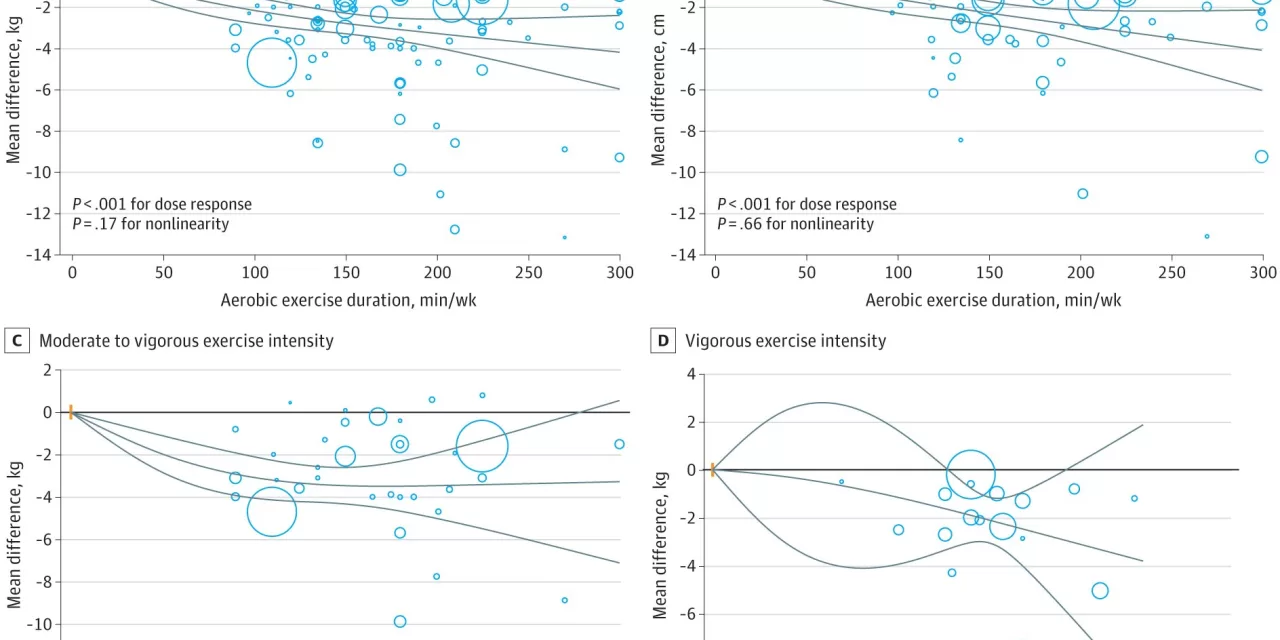A new study led by researchers from Imperial College London, in collaboration with colleagues in Iran, has revealed that increasing the duration of aerobic exercise significantly improves weight loss, waist circumference, and body fat percentage in overweight and obese adults. The research, published in JAMA Network Open, reinforces existing health guidelines recommending at least 150 minutes of moderate-to-vigorous aerobic exercise per week for effective weight management.
The study, titled Aerobic Exercise and Weight Loss in Adults: A Systematic Review and Dose-Response Meta-Analysis, analyzed data from 116 randomized clinical trials involving 6,880 participants, primarily adults with overweight or obesity. The trials, with durations of at least eight weeks, focused on supervised aerobic exercise and its impact on body composition.
Findings show a clear dose-response effect, where longer durations of aerobic exercise correlate with greater reductions in body weight, waist circumference, and body fat percentage. For each additional 30 minutes of aerobic exercise per week, participants experienced an average reduction of 0.52 kg in body weight, 0.56 cm in waist circumference, and 0.37% in body fat.
The study revealed that 150 minutes of aerobic exercise per week resulted in clinically significant improvements: a reduction of 2.79 kg in body weight, 3.26 cm in waist circumference, and 2.08% in body fat. Notably, further increases in exercise duration led to even greater reductions, with 300 minutes per week corresponding to a 4.19 kg reduction in weight, 4.12 cm in waist circumference, and 1.78% in body fat.
“Our findings demonstrate that there is a linear relationship between exercise duration and weight loss outcomes,” said Dr. Ahmad Jayedi, lead researcher of the study. “The more time spent performing moderate-to-vigorous aerobic exercise, the greater the reductions in weight and waistline measurements.”
The study’s results underscore the importance of adhering to exercise guidelines, particularly for those struggling with obesity. Global obesity rates have tripled over the last 45 years, with more than 50% of adults worldwide now classified as overweight or obese. Obesity is linked to a host of health complications, including heart disease and diabetes, and is the leading cause of death-related diseases, according to the 2019 Global Burden of Disease Study.
Current health guidelines recommend 150 minutes of moderate-intensity aerobic exercise per week as a baseline for meaningful weight loss. This new meta-analysis confirms the efficacy of this recommendation, providing stronger evidence for the importance of consistent physical activity in managing body weight and improving health outcomes.
As the global obesity epidemic continues to grow, these findings highlight the critical role of exercise in weight management and overall health. While exercise alone may not be a cure-all, it remains a crucial tool in the battle against obesity and its associated risks.
For more information, the full study can be accessed in JAMA Network Open.
References: Ahmad Jayedi et al, Aerobic Exercise and Weight Loss in Adults, JAMA Network Open (2024). DOI: 10.1001/jamanetworkopen.2024.52185












